THE SERA BOARD AND EXECUTIVE COMMITTEE
The Society for Ecological Restoration Australasia Chapter:
Chairperson
- Prof Kingsley Dixon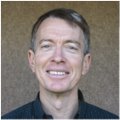
Specialist activities/interests:
- Conservation biology.
- Minesite and urban bushland ecological restoration.
- Evolutionary processes of native species and landscapes.
- Seed science.
Kingsley Dixon is a botanist and biologist who has research experience
in ecological restoration programs with the community, industry
and government. His restoration interests include: coastal restoration;
threatened species conservation and translocation; post-mining restoration
including biodiverse communities; working with communities to restore
and manage degraded lands; marine restoration including seed biology
of seagrasses. He is participating in arid land restoration in Australia
and overseas including a large program investigating restoration
options in Saudi Arabia.
Positions: Board member, International Society for Ecological
Restoration; Chair of Membership Committee International Society
for Ecological Restoration; Immediate-Past President, Australian
Network for Plant Conservation; Member, International Panel of Experts
for the Global Strategy for Plant Conservation; Consulting Editor,
In Vitro Cell and Developmental Biology; National Judging Panel,
Eureka Awards; National Grant Advisory Panel, Australian Flora Foundation;
Chairman, Research Committee, Australian Orchid Foundation; Member,
IUCN Species Survival Commission, Plant Reintroduction Specialist
Group.
Vice-Chairperson
- Vern Newton
Specialist activities/interests:
- Construction materials, quarrying and mining experience
across Australia with a number of leading construction materials
and mining companies.
- Operational, project management, logistical, marketing
and human resources experience.
- Advocacy with local, state and federal government and agencies.
- Working with science to provide a link to industry for
improved restoration outcomes.
- Completing best practice restoration of Banksia woodland.
I have been involved in driving sustainable policies within corporate
organisations including developing Energy Management Policy for
a large Australian construction materials company, which resulted
in the particular company being the first sign up for the Australian
Greenhouse Challenge with the Federal Government about six years
ago for that industry segment.
With my current employer, I am heavily involved in the restoration
works of sand quarries. An important part of the restoration is
research projects involving many PhD, post graduate and under graduate
students studying at UWA / Kings Park (and developing such partnerships).
These world leading Banksia Woodland restoration and research works
have resulted in Rocla Quarry Products being awarded a Golden Gecko
in 2008, the most prestigious environmental award in the State of
Western Australia.
With Rocla I have engaged with research institutes to help achieve
partnerships between industry and science so that a higher standard
of restoration is achieved on the ground. I have also provided information
to other companies to assist with improving their restoration outcomes.
Additionally I have spoken with Kingsley Dixon to government (both
Federal & State) and regulatory bodies regarding the benefits
of restoration to ensure restoration principles are a key focus
for government so that development occurs in a sustainable manner
and net increases in habitat begin to occur.
Secretary
- Alison Ritchie 
Specialist activities/interests:
- Conservation and population genetics.
- Restoration ecology.
- Pollination.
Dr Alison Ritchie completed a BSc. in Conservation Biology and Management
with First Class Honours from The University of Western Australia
(UWA) in 2009. Her honours research project was entitled Realized
mating patterns of Banksia attenuata: contrasting restored and natural
populations. In 2015 she completed a PhD research project with
The University of Western Australia's School of Plant Biology, based
at Kings Park and Botanic Garden, focusing on population genetics
and mating patterns of Banksia species in restored communities.
Alison is now a Research Associate at Curtin University, Western
Australia.
Treasurer
- David Hancock
Interests:
- Business analysis.
- Plant propagation for restoration.
- Environmental and restoration project management.
- Volunteer for community environmental and conservation
groups.
David is an Environment Consultant with the Perth based Natural Areas Consulting, an environment business he founded in 2003.
General
Board Member: Affiliate and ENGO communication
- Tein McDonald
Specialist interests:
- Techniques of harnessing natural regeneration, where possible, to rebuild the resilience of damaged vegetation communities
- Raising standards of practice, particularly to direct all restoration efforts to achieve functioning communities, able to reproduce and persist over time
- Linking restoration to culture, particularly through Indigenous land management and cultural regeneration
- Encouraging practitioners to report on their work, using sound but uncomplicated monitoring designs
- Networking to encourage cooperation between groups actively involved in restoration to optimise our collective effectiveness
I have been involved in the philosophy, ecology and practice of
ecological restoration for nearly 30 years, as a bush regenerator,
technical officer, TAFE teacher, and planner. After completing my
PhD 'Ecosystem Resilience and the Restoration") I have been privileged
to have worked as Editor of the journal "Ecological Management &
Restoration" for the Ecological Society of Australia, attempting
to increase engagement (by researchers, managers and practitioners)
in the restoration and management discourse. I remain involved in
restoration practice, Indigenous land and cultural management, and
am active in the Australian Association of Bush Regenerators, whose
members work to restore damaged remnant and regrowth vegetation
in agricultural and urban landscapes throughout NSW and Qld. Having
been a member of the international body of SER since its first meeting,
I would like to see SERA become a pivotal organization, helping
all Australian restoration groups and individual restorationists
achieve something of our vision of a region increasingly protecting
and healing indigenous ecosystems at a time when degradation pressures
are immense and increasing.
General
Board Member: International Development (New Zealand)
- Bruce Clarkson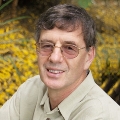
Specialist interests:
- Independent reviewer of progress of New Zealand Biodiversity Strategy
- Advisor to New Zealand restoration projects including: Waiwhakareke Natural Heritage Park, Hakarimata Restoration Trust, Maungatautari Ecological Island
- Plant ecologist with main interests: Vegetation pattern, processes, and change (succession); Ecosystem Restoration and reconstruction; Autecology and conservation of threatened native plants
Professor Bruce Clarkson is Director of the Centre for Biodiversity and Ecology Research at the University of Waikato. He has published some 70 papers and several books on various aspects of the systematics and ecology of New Zealand native plants and vegetation. Throughout his research career he has maintained a strong interest in applying aspects of his research on the ground to assist in the protection and restoration of native plants and ecosystems. He currently leads a Ministry of Science and Innovation funded research program on determining the best methods for restoring indigenous biodiversity in cities.
General Board Member: - Jen Ford
Specialist activities/interests:
- Highly experienced practitioner (20 years) using a range of restoration
approaches on a wide range of vegetation and habitat types.
- Successfully worked across sectors in a range of roles i.e. state
and local government, not-for-profit, private.
- Well-developed communication skills.
- High level skills in linking science with practice.
- Strategic thinker.
- Policy development.
Jen is a highly experienced ecological restoration practitioner who has worked in a range of positions including as a bush regenerator; a TAFE teacher; a senior officer in local government; and currently in the private sector as Ecosure's Principal Restoration Ecologist. Her experience includes successfully applying a range of ecological restoration approaches across a wide range of ecosystem and habitat types; large scale restoration; designing environmental education programs; and developing and presenting information to assist a wide range of stakeholders in implementing better restoration standards and weed control. Her leadership qualities, experience serving on committees and passion for connecting people with our environment ensures she will advance SERA's strategic vision.
General
Board Member - Peter Erskine
Peter is a Senior Research Fellow at The University
of Queensland, Brisbane, Queensland, Australia
Specialist interests:
- Leading multi-disciplinary teams designing monitoring programs,
rehabilitation strategies and understanding ecosystem function for
industry and regulatory bodies.
- Working on forest landscape restoration and mine rehabilitation
in Australia, south-east Asia and Africa.
- Forest landscape restoration: developing ways to scale-up and
restore large areas of degraded land.
- Developing research solutions with research organisations, mining
companies and government agencies on issues of land restoration
and the environmental impacts of mining.
Peter is an ecologist with experience in a range of countries and
ecosystems. He leads the landscape ecology group in the Centre for
Mined Land Rehabilitation at The University of Queensland. Over
the last two decades he has worked on ecosystem function, landscape
forest restoration and revegetation techniques in Australia, Laos,
PNG, Sierra Leone, Uganda and Vietnam. He currently works closely
with companies, government agencies and NGOs to develop monitoring
methods to assess environmental impacts of human activities. Peter’s
research interests include the development of novel ecosystems,
the utility of reference sites for measuring rehabilitation success
and the deployment of unmanned aerial vehicles to quantify issues
of scale.
General
Board Member - Dr Lucy Commander
Specialist interests:
- Seed Ecology
- Mine Restoration
- Arid Zones
- Topsoil seed banks and direct seeding
I am passionate about improving restoration through efficient seed
use, including optimising seed quality and storage, and understanding
seed germination and dormancy. I am also interested in arid-zone
ecology, seed ecology and seedling recruitment & establishment.
I have been undertaking research on seeds and restoration since
2003, and have worked on projects with Argyle Diamonds, Shark Bay
Resources, Newcrest (Telfer Gold Mine) and Rio Tinto Iron Ore.
I hold a BSc (Hons) and a PhD from The University of Western Australia.
Board Member at Large - Craig Copeland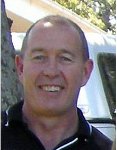
Specialist interests:
- Natural resource project management
- Acquatic/wetland Rehabilitation
- Fish Passage ecology and remediation
- Environmental Flow Management
- Aquatic Protected Area Management
I have over 20 years work in protecting and restoring fish habitat. In that time I initiated the Kooragang Wetland Rehabilitation Project and the Clarence Floodplain Project; created the NSW Aquatic Habitat Rehabilitation Program - the first of its kind in Australia. It includes subprograms that are also Australian 'firsts'; the Weir Removal, Road Crossing, Floodgate Management and Hume to Yarrawonga Resnagging Programs. The work of these programs and their staff has been recognised with the NSW Premiers Public Sector Awards 2007 - Gold Award (Environment) for the Aquatic Habitat Rehabilitation Program and the Banksia Award 2010 Gold (Water) for the Bringing Back the Fish Project. I also served on the Board of WetlandCare Australia 1997-2009 including three as Chairman and currently sit on the Executive of the Editorial Board of the Journal of Ecological Management and Restoration.
Board Member at Large - Bruno Fogliani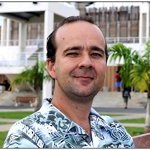
Specialist interests:
- Seed ecophysiology
- Revegetation of mining degraded land on ultramafic rocks and of
dry forests
- Conservation biology of New Caledonian vegetations
- In vitro researches dedicated to rare plants
Bruno Fogliani is actually an assistant professor working at the "LIVE" (EA 4243)/UNC and will be the Assistant Director of the New Caledonian Agronomic Institute from the 1st of January 2012. He is actually responsible of the LIVE "Seed Ecophysiology" team. He is involved in the coordination of several research contracts engaged with New Caledonian Institutions as well as with Mining Industries dedicated to seed germination studies in order to optimize revegetation and/or ecological restoration of degradred land. He recently developed a program on Amborella trichopoda germination requirements.
He co-organized in 2010 in New Caledonia an international workshop dedicated to "seed ecology". He is member and regional coordinator of the ISES. Also member of the SCB, of the ISSS and of the French Seed Biology Network. He is also member of the program dedicated to the conservation of the New Caledonian dry forests.
Board Member at
Large - Justin Jonson 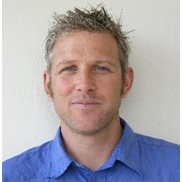
Specialist interests:
- Planning and implementing ecological restoration at scale
- Ecosystem services, natural capital and carbon funded restoration
- Landscape scale conservation - Gondwana link
- Applied theory - Models of plant community assembly; filters; thresholds
Justin Jonson is a cross disciplinary practitioner and businessman who runs a company (Threshold Environmental Pty Ltd) focused on large scale ecological restoration in cleared landscapes. Since 2008 he has worked with the community, NGOs, government, and international conservation focused institutions to lead the re-establishment 750 hectares of marginal farmland in the southwest of Western Australia. An Honorary Research Fellow for the Centre for Excellence in Natural Resource Management at the University of Western Australia, he has published papers on both ecological restoration and carbon sequestration for local woodlands. His current interest is in increasing the scale of ecological restoration projects for cleared lands.
Board Member at
Large - David Freudenberger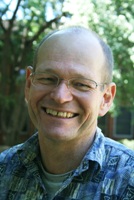
Dr David Freudenberger is a lecturer and researcher
at the Australian National University, Canberra, Australia.
Specialist interests include ecological restoration, woodland ecology, ecosystem services.
David has a diverse research career commencing in 1980 conducting an Honours project on long term grassland and shrubland dynamics across the coastal hills of Southern California. This led to an interest in herbivory and digestion applied to MSc research on nutrition in farmed red deer (Lincoln University, NZ), and a PhD on the digestive physiology of kangaroos and goats (UNE, Armidale, NSW), followed by a post-doc back in NZ on the seasonality of gut function and metabolism in red deer (Massey University). To get himself out of the lab and animal house, David joined CSIRO Wildlife and Ecology in 1991 to conduct grazing management research in the rangelands of eastern Australia. By 2000, CSIRO shifted research focus from eastern rangelands to agricultural landscapes dominated by woodlands. This led to research on the impact of landscape fragmentation on woodland bird assemblages and other taxa. In such highly cleared landscapes restoration is a priority, so David led a number of research projects on the ecosystem services derived from government supported native plantings in southern NSW. This research put David in contact with the NGO, Greening Australia, which he joined in 2007 as Chief Scientist. There his collaborative research projects included effectiveness and cost of revegetation technologies, carbon sequestration measurement and modelling, biofuels from native species, and the benefits of biochar application for improving restoration effectiveness. David joined ANU in 2012 to continue research in applied restoration practice and lecture in management of wooded landscapes. He also consults for the Australian mining industry on rehabilitation design and implementation.
Read more about David Freudenberger...
Ex-officio: Early Career and Student representative
- Valerie Hagger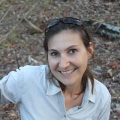
Specialist activities/interests:
- Biodiversity conservation and ecological restoration.
- Worked as a senior environmental consultant for over 12 years.
- Skilled in linking science with practice.
- Ecological restoration symposia organiser.
My research interests include biodiversity conservation and ecological restoration. My current research project (PhD) investigates the potential for achieving multiple outcomes for biodiversity conservation and carbon sequestration from restoration projects. More specifically it involves evaluating how the costs and likelihood of success of restoration varies with vegetation types, environmental conditions, current and historic land use, ground preparation, planting design and species planted on a national scale. It also seeks to evaluate the trade-offs between restoration for biodiversity and carbon outcomes.
The overall objective is to improve national level data on restoration costs and success, to support decision-making in prioritisation of restoration options through consideration of uncertainty, and to inform stakeholders about the viability of restoration to deliver co-benefits for carbon and biodiversity in an emerging carbon economy.
<top> |




















